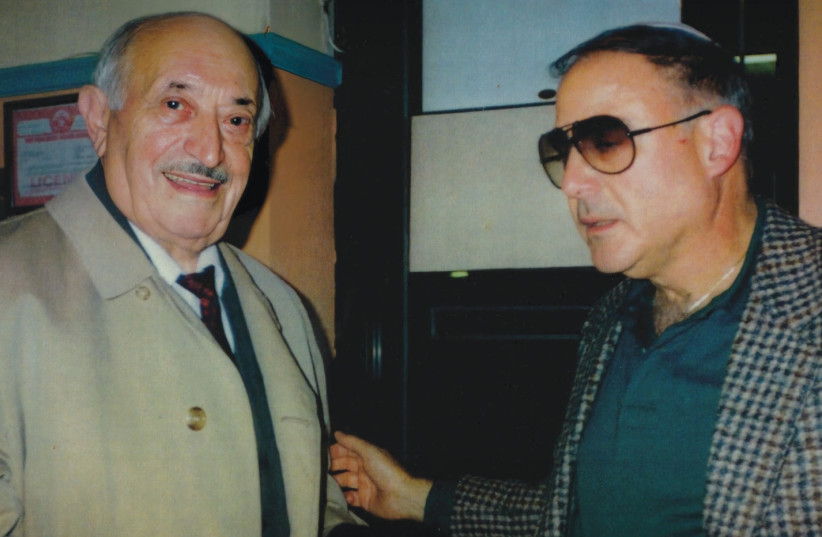Meet the former mobster who helped hunt Nazis

Former mobster Myron Sugerman talks about fighting antisemitism and helping Nazi-hunter Simon Wiesenthal in a new documentary.
Few people in history can say they have seen as much as Myron Sugerman. Born into the dramatic underworld of the Jewish mob, his life has seen him become the king of the illegal slot machines, spend time in prison, do business around the world and secretly raise funds for the world’s most preeminent Nazi hunter.
The 84-year-old’s life story has recently been immortalized in the documentary The Last Man Standing: The Chronicles of Myron Sugerman, made by British-Israeli entrepreneur Jonny Caplan and is available on Amazon Prime and is set to roll out on other platforms later this year.
Despite being born into the underworld amid the golden age of United States organized crime, Sugerman never lost his Jewish pride. That, in fact, was actually the point behind the Jewish mafia as a whole.
A different time for Jews
Sugerman was born at a different time. Jews in the US were first or second-generation immigrants and they lived in impoverished ghettos, like Manhattan’s Lower East Side. Like the Italian and Irish immigrants, many Jews formed gangs. It was the kind of thing that, as Sugerman explained in an interview with The Jerusalem Post, couldn’t happen today, even as antisemitism continues to rise worldwide. Back then when Jews were living in poverty, unlike today, it was possible to form these gangs, with such notorious gangsters as Bugsy Siegel, Meyer Lansky, Dutch Schultz and Doc Stacher becoming household names on the same level as Lucky Luciano and Al Capone. Sugerman’s father was one such gangster, Barney “Sugie” Sugerman, and so the world of crime became his birthright.
But this was also a time of severe antisemitism. The rise of the Nazis in Germany saw Nazi ideology being imported into the US, in particular Fritz Kuhn’s German American Bund Party. In response, the Jews took matters into their own hands.

“This is a Jewish problem and this is going to be resolved with Jewish fists,” Sugerman recalled Lansky saying, as shown in the documentary.
It’s no wonder then, that being Jewish is of such profound importance to Sugerman. It’s also why, despite not having lost anyone in the Holocaust, the event had such a profound impact on him, leading him to provide financial and strategic support to the Nazi hunter Simon Wiesenthal. Thanks to Sugerman’s help, Weistenthal was able to extend his information-gathering network and help continue his efforts hunting down Nazis. In particular, Sugerman played a role in Weisenthal’s hunt for Josef Mengele, the “Angel of Death” who served as a doctor at the Auschwitz concentration camp.
And in return for Sugerman’s help, Weisenthal would help as a reference whenever he was in legal trouble to get his sentences reduced.
That was something the king of the slot machines certainly found useful throughout his career outside the law, having faced jail time for a number of reasons, most notably a copyright infringement suit after he started selling boards that were just blatant Pac-Man rip-offs in the 1980s.
This is only a small snapshot of the diverse globe-trotting outlaw life that Sugerman has led and it’s a life for which he has no regrets.
“He’s like a Pandora’s box of history and information,” Caplan remarked. “There is so much unlocked information there that it’s almost impossible to catalog it all.”

The Last Jewish Gangster
CAPLAN HAD gotten involved with Sugerman through a mutual friend who had helped Sugerman write his memoir, The Chronicles of the Last Jewish Gangster: From Meyer to Myron. This led them to make their 70-minute documentary together, having to sift through 50 hours of content to tell a cohesive story, though it is only part of the story.
As a result, their collaboration isn’t stopping here. Caplan is planning on creating a TV series that tells Sugerman’s life story. With Sugerman himself serving as a key consultant throughout the production, the series will finally serve as a way of telling the world the story of a life of crime and justice that the last Jewish gangster lived.
“Some of the things he’s said will live with me for the rest of my days,” Caplan said.
But regardless of his many adventures, Sugerman’s finest hours aren’t pulling off some business deal or getting away with a crime or even helping Simon Weisenthal.
When asked what his greatest accomplishment was in his long, storied life, Sugerman gave two answers. The first was being a Jew. The second was his son being able to become an Orthodox rabbi who teaches daf yomi.
“Even a cold-hearted gangster would shep nachas (to derive pride and joy)” if their child became a rabbi or member of the clergy, Sugerman explained.
Producing this documentary wasn’t easy for Sugerman and Caplan. Aside from the fact that COVID-19 was in full swing and restrictions presented a number of issues, Sugerman himself got hit with COVID twice, as well as vertigo and pneumonia, all in the weeks before filming.
But like the name of the documentary implies, Myron Sugerman is the last man standing and it will take more than that to keep him down.
Today, he’s still active, sharing war stories with other old-timers and staying up to date on what’s going on in the world, especially antisemitism.
According to Sugerman, antisemitism today is the worst it’s been since right before the 1930s and while there can’t be anything today like the Jewish gangsters of his day to fight back, it’s things like this documentary, the planned TV series and a planned podcast series – which will see Myron Sugerman talking in a more unfiltered, unedited format – that will help raise awareness of antisemitism.
But Sugerman has another more immediate goal for what comes next.
“What’s next for me? Get up tomorrow morning and make sure my name isn’t in the obituary column of the local newspaper,” he said.
